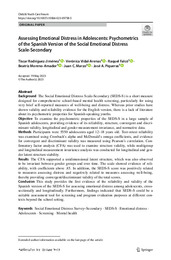Título :
Assessing Emotional Distress in Adolescents: Psychometrics of the Spanish Version of the Social Emotional Distress Scale‑Secondary |
Autor :
Rodríguez-Jiménez, Tíscar 
Vidal Arenas, Verónica 
Falcó, Raquel 
Moreno-Amador, Beatriz 
Marzo Campos, Juan Carlos
Piqueras, Jose A  |
Editor :
Springer |
Departamento:
Departamentos de la UMH::Psicología de la Salud |
Fecha de publicación:
2023-06-03 |
URI :
https://hdl.handle.net/11000/36138 |
Resumen :
Background The Social Emotional Distress Scale-Secondary (SEDS-S) is a short measure
designed for comprehensive school-based mental health screening, particularly for using
very brief self-reported measures of well-being and distress. Whereas prior studies have
shown validity and reliability evidence for the English version, there is a lack of literature
about its psychometric properties for Spanish-speaking youths.
Objective To examine the psychometric properties of the SEDS-S in a large sample of
Spanish adolescents, providing evidence of its reliability, structure, convergent and discriminant validity, longitudinal and gender measurement invariance, and normative data.
Methods Participants were 5550 adolescents aged 12–18 years old. Test–retest reliability
was examined using Cronbach’s alpha and McDonald’s omega coefcients, and evidence
for convergent and discriminant validity was measured using Pearson’s correlation. Confrmatory factor analysis (CFA) was used to examine structure validity, while multigroup
and longitudinal measurement invariance analysis was conducted for longitudinal and gender latent structure stability.
Results The CFA supported a unidimensional latent structure, which was also observed
to be invariant between gender groups and over time. The scale showed evidence of reliability, with coefcients above .85. In addition, the SEDS-S score was positively related
to measures assessing distress and negatively related to measures assessing well-being,
thereby providing convergent/discriminant validity of the total scores.
Conclusion This study provides the frst evidence of the reliability and validity of the
Spanish version of the SEDS-S for assessing emotional distress among adolescents, crosssectionally and longitudinally. Furthermore, fndings indicated that SEDS-S could be a
suitable assessment tool for screening and program evaluation purposes at diferent contexts beyond the school setting.
|
Palabras clave/Materias:
Social Emotional Distress Survey–Secondary
SEDS-S
Emotional distress
Adolescents
Screening
Mental health |
Área de conocimiento :
CDU: Filosofía y psicología: Psicología |
Tipo de documento :
info:eu-repo/semantics/article |
Derechos de acceso:
info:eu-repo/semantics/openAccess
Attribution-NonCommercial-NoDerivatives 4.0 Internacional |
DOI :
https://doi.org/10.1007/s10566-023-09758-5 |
Publicado en:
Child & Youth Care Forum, Volume 53, pages 367–387, (2024) |
Aparece en las colecciones:
Artículos- Psicología de la Salud
|
 La licencia se describe como: Atribución-NonComercial-NoDerivada 4.0 Internacional.
La licencia se describe como: Atribución-NonComercial-NoDerivada 4.0 Internacional.
.png)
